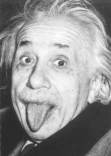
Great Minds List | Greatest Quotes | More Great Quotes | Quote Generator | Not So Great Minds

From a correspondence between Ensign Guy H. Raner and Albert Einstein in 1945 and 1949. Einstein responds to the accusation that he was converted by a Jesuit priest: "I have never talked to a Jesuit prest in my life. I am astonished by the audacity to tell such lies about me. From the viewpoint of a Jesuit priest I am, of course, and have always been an atheist." "I have repeatedly said that in my opinion the idea of a personal God is a childlike one.You may call me an agnostic, but I do not share the crusading spirit of the professional atheist whose fervor is mostly due to a painful act of liberation from religious indoctrination received in youth." Freethought Today, November 2004
"It was, of course, a lie what you read about my religious convictions, a lie which is being systematically repeated. I do not believe in a personal God and I have never denied this but have expressed it clearly. If something is in me which can be called religious then it is the unbounded admiration for the structure of the world so far as our science can reveal it." From a letter Einstein wrote in English, dated 24 March 1954. It is included in Albert Einstein: The
From a letter Einstein wrote in English, dated 24 March 1954. It is included in Albert Einstein: The Human Side, edited by Helen Dukas and Banesh Hoffman, published by Princeton University Press. Albert Einstein, Out of My Later Years (New York: Philosophical Library, 1950), p. 27.
"During the youthful period of mankind's spiritual evolution, human fantasy created gods in man's own image who, by the operations of their will were supposed to determine, or at any rate influence, the phenomenal world... The idea of God in the religions taught at present is a sublimation of that old conception of the gods. Its anthropomorphic character is shown, for instance, by the fact that men appeal to the Divine Being in prayers and plead for the fulfillment of their wishes... In their struggle for the ethical good, teachers of religion must have the stature to give up the doctrine of a personal God, that is, give up that source of fear and hope which in the past placed such vase power in the hands of priests." Albert Einstein, reported in Science, Philosophy and Religion: A Symposium, edited by L. Bryson and
"Thus I came...to a deep religiosity, which, however, reached an abrupt end at the age of 12. Through the reading of popular scientific books I soon reached a conviction that much in the stories of the Bible could not be true....Suspicion against every kind of authority grew out of this experience...an attitude which has never left me." The Quotable Einstein
"A man's ethical behavior should be based effectually on sympathy, education, and social ties; no religious basis is necessary. Man would indeed be in a poor way if he had to be restrained by fear of punishment and hope of reward after death."